Health Equity Division Newsletter - September 2024

In this newsletter:
Greetings from the Health Equity Strategy and Innovation Division
Message from the Director
CONNECT: Launching the next two years of COVID-19 community recovery work
STRENGTHEN: Health equity strategist model makes waves across MDH
AMPLIFY: Getting to know the new Office of American Indian Health
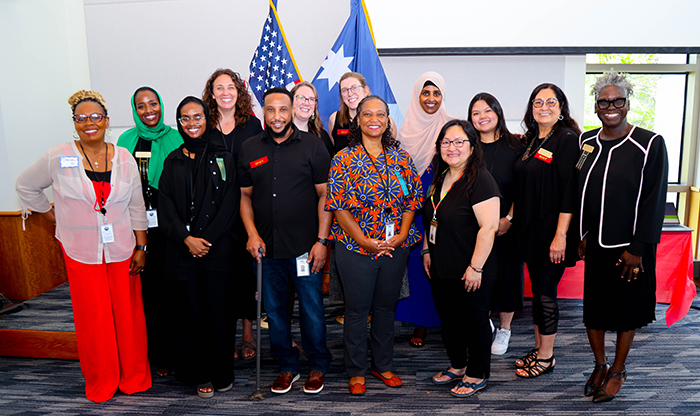
Greetings from the Health Equity Strategy and Innovation Division
As summer comes to a close, we are happy to share new updates with you about some of the work happening to advance equity both within MDH and across the great state of Minnesota. This edition features the launch of another two years of partnerships with COVID-19 Community Coordinators, examples of how health equity strategists are partnering with divisions across MDH to advance equity in their work, and a guest piece from our sister office, the Office of American Indian Health.
And of course, we couldn’t do this work without YOU—our colleagues within MDH, our community and healthcare partners, and our Tribal and local public health counterparts. We thank you for your partnership!
[Interested in being a guest writer for a future newsletter? Email your idea to health.equity@state.mn.us and we will be in touch!]
Message from the director
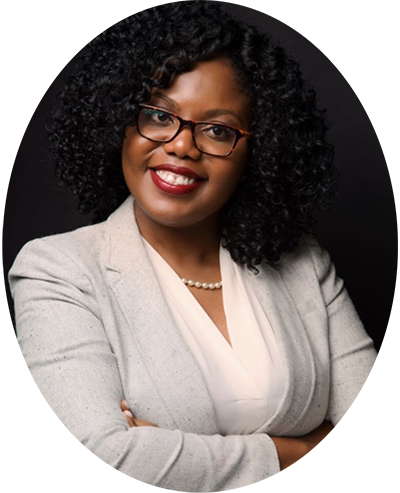
This summer has been filled with a lot of reflection about what I have learned so far as the director of the new Health Equity Strategy and Innovation Division. It has also been a time to pause and celebrate the work we’ve done so far together. As a new and growing division, we set aside time to come together with our families and recognize our exceptional division staff who have worked hard all year to support our community partners and internal agency colleagues. We also created a space to welcome back 44 COVID-19 Community Coordinator partner organizations and commemorate our collective successes over the past several years. Together, we are poised to look ahead at post-COVID recovery efforts while also acknowledging the rise in COVID-19 cases—a reminder that we all should remain vigilant. As agents of change, I believe it is critical to take time to pause, rest, and celebrate. Health equity work that centers on systems change is a long journey; taking breaks to breathe, look back, and see how far we have come can help re-energize and motivate us to keep going.
As we head into the last quarter of the year, I will continue to be in discovery mode while reflecting on all that I have learned about this critical work and space. For me, September and the fall, or the “-ber” months, is usually when I go into strategic mode, thinking about how to implement and improve our processes. What do we need to establish to be successful? What relationships do we need to pay attention to and foster? What systems do we need to implement to keep us on track and accountable to internal and external partners who we support? What can we do better?
The fourth quarter of the year is a time of preparation for the year ahead to set us up for the best chance at meeting our goals. It is a time for alignment, and I’m excited to do work that aligns with MDH’s new strategic plan to invest in efforts that advance health equity. We will accomplish this internally through the work we do within and across divisions, by supporting equitable grants and policy improvement efforts, and by strengthening external relationships that empower our communities and lean into systems change. It takes all of us to do this work for a better Minnesota.
Odichinma (Odi) Akosionu-DeSouza (she/her)
Division Director
CONNECT
[We are a network hub – leading, connecting and strengthening networks of health equity leaders and partners across MDH and Minnesota communities.]
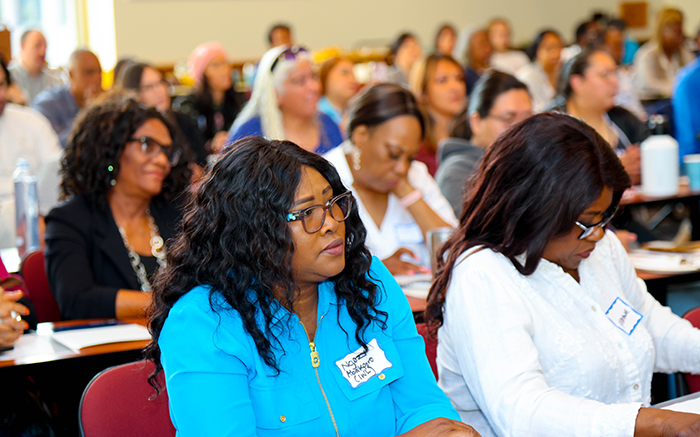
Launching the next two years of COVID-19 community recovery work
Our team met in person last month with more than 100 community partners involved in the COVID-19 Community Coordinators (CCC) initiative to kick off another two years of contracts focused on pandemic recovery efforts. The orientation was an all-day event designed to set community partners up for success in the next two years of funding and celebrate collective achievements over the last several years.
“It was great to see all of the CCCs in person,” said Aisha Galaydh, a community engagement planner for the Health Equity Division who has supported CCC contractors since 2021. “Many of them have hired new staff, so it was great to meet them and have a chance to celebrate their achievements.”
The CCC initiative began in late 2020 as COVID-19 inequities grew, misinformation persisted, and the need to engage trusted community partners became imperative. MDH began contracting with trusted community organizations serving those hit hardest by COVID-19, including communities of color, American Indian communities, LGBTQ communities, and Minnesotans with disabilities, to host testing events in community spaces and to connect community members with basic resources such as housing and food assistance. When COVID-19 vaccines became available, CCCs played a pivotal role in ensuring these communities got vaccinated.
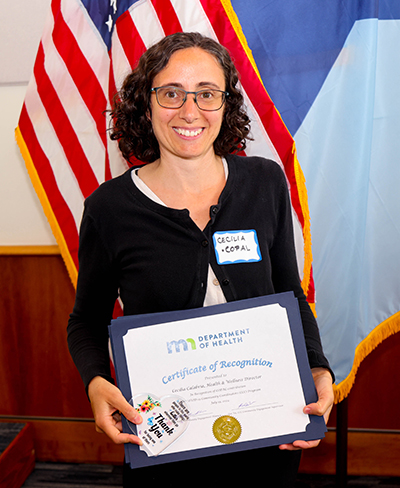
“For the last four years, we were working really hard on the opportunity MDH gave us to bring trusted information to the community, bring vaccines, resources, but also education, so that every person in our community can learn how to advocate for their own health,” shared Cecilia Calabria, health and wellness director at Comunidades Organizando el Poder y la Acción Latina (COPAL), one of the continuing contractors. “I’m really excited for all the work we can do together, and I also thank MDH for believing in the CCC program and continuing funding for our organizations.”
For this third cycle of funding—which runs from July 2024 through June 2026—some testing and vaccination work will continue with an emphasis on comprehensive community recovery activities. Recognizing that the needs of communities to recover extend beyond immediate physical health concerns to include the social determinants of health—in other words, the conditions in the environments where people are born, live, learn, work, and play—the initiative will fund contractors to advance health equity by creating programs and resources needed to address these broader community needs.
MDH is working with 44 contracted organizations across the state for this nearly $18.8 million funding cycle, and for the first time since the program’s inception, all 44 CCCs will engage in recovery work. Some of the focus areas of the services they’ll provide include mental health and wellbeing, long COVID or chronic condition management, and employment assistance. The majority of the CCCs will also use some of the funds to provide vaccinations in trusted community spaces over the next year.
“A lot of the CCCs are trying to be really innovative in how they can increase vaccine confidence and [keep people] up to date on their vaccines,” Aisha explained. “I also know a lot of them will be expanding their services to recovery as we move further away from the pandemic. I’m excited to see how those services will be expanded."
Reneka Evans, a community engagement planner for the Health Equity Division who has also supported CCC contractors since 2020, explained that there are new factors in this cycle that will require ingenuity on the part of the CCCs. In the last cycle, the contractors had funding to offer individuals $100 incentives for getting vaccinated, but that funding has ended. We will also have an updated vaccine available later this year, which the Centers for Disease Control and Prevention has recommended for all Americans ages 6 months and older.
“It will be exciting to see how they’re going to be creative,” Reneka said “They’re the experts and the voice of their community. It’ll be interesting to see what their messages are to move from 5 or 10 people being vaccinated to 30, 40 and beyond.”
A list of the contracted CCCs for this funding cycle can be found on the COVID-19 Community Coordinators page.
STRENGTHEN
[We provide leadership in advancing health equity and cultivate health equity leaders within MDH and across Minnesota communities.]
Health equity strategist model makes waves across MDH
A year after MDH launched a new health equity strategist model to connect, strengthen, and amplify health equity efforts across the agency, the team is hard at work embedding equity across MDH divisions. Led by Marisol Chiclana-Ayala in the Health Equity Strategy and Innovation Division, the team is made up of 10 staff who are embedded simultaneously within the Health Equity Division and within divisions across MDH.
“There is so much inspiring work happening across the department,” shared Odi Akosionu-DeSouza, Health Equity Strategy and Innovation Division director. “We’re excited to continue to support divisions in their journeys to advance equity and share some of their innovate practices across divisions.”
In the Environmental Health Division, for example, Health Equity Strategist Lucas Simmons is working with the Indoor Air Unit on a project to increase community engagement related to radon testing.
“There’s a lot of mistrust within the public of the government and radon professionals coming into their home [to do testing], and without knowledge of radon and the dangers, some people are throwing the tests away,” Lucas explained. This is especially likely to occur in multifamily rental housing units where there could be a breakdown in communication between the landlord, who often schedules the test, and the tenants. Without testing, families could be exposed to high levels of radon without knowing it and being able to mitigate it.
This is an equity issue, he explained, because a lot of the people living in multifamily housing are people of color, putting them at greater risk for lung cancer—one of the harmful effects of radon. The team is working together to engage community groups in the development of effective educational materials, with the hope of engaging landlords and radon professionals in the future.
Meanwhile, Pakou Xiong, health equity strategist for the Child and Family Health Division, has been working together with her division colleagues to ensure each and every staff member understands what equity means for their role. The division has taken part in the National Maternal and Child Health Workforce Development Center’s Learning Journey program, which supports teams from across the nation in tackling a priority challenge of their choosing.
"The Learning Journey program supports teams to work on their focus goals,” Pakou explained, “Our focus goal is embedding equity into all of our child and family health work.”
One of the ways they’re accomplishing this is by piloting a redesign of the Request for Proposals (RFP) process, or the way grant funds are competitively awarded to community, local public health, and Tribal partners across the state. The team is starting with grants from the Maternal and Child Health section with the hope of expanding across other sections in the division. The process includes reviewing and revising, through an equity lens, how RFPs are written, how applications are scored, and how technical support is provided to applicants. The implications of this process have the potential to be far-reaching, as the Maternal and Child Health section alone distributes more than $11 million per year in grants, which is only a portion of the outgoing grants in the Child and Family Health Division.
“I’ve only been here for a year, but I feel like I've been in this role for so long because it builds on the work that I've been doing for years,” shared Pakou, who most recently worked as a contract manager in the Health Equity Strategy and Innovation Division before becoming a health equity strategist. “Child and Family Health is a space where all of my professional and community work has come together.”
We look forward to continuing to highlight MDH's work to advance equity through the lens of this model in future newsletters. Learn more about our health equity strategists on the Health Equity Division Staff and Contact Information page.
AMPLIFY
[We amplify the work of communities most impacted by health inequities and support them to drive their own solutions.]
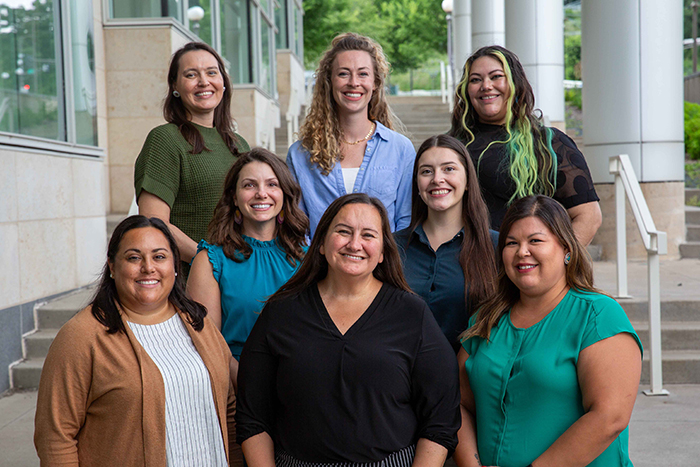
Getting to know the Office of American Indian Health
by Kris Rhodes, director, and Heather Brink, communications specialist
The Office of American Indian Health (OAIH) was established in 2023 and is dedicated to improving the health and wellbeing of Minnesota American Indian communities. This office is situated in the Health Equity Bureau, and we work across all five bureaus at MDH. Our goals are to ensure Tribes and Tribal perspectives are respectively included in all of Minnesota’s public health initiatives. We work directly with the 11 sovereign Tribal nations who call Minnesota home, currently manage six grant programs with Tribes and urban American Indian communities, and we work collaboratively with the MDH Tribal Liaison, Ravyn Gibbs, who ensures the Tribal consultation policy is followed.
Our director, Kris Rhodes, is an enrolled citizen of the Bad River Band of Lake Superior Chippewa and a descendent of the Fond du Lac band of Lake Superior Chippewa. Her background as the chief executive officer of the American Indian Cancer Foundation and as the founder of Asemaake, an Indigenous-led consulting group, help her bring decades of experience and a unique perspective to working in state government. We currently have eight team members working on grant programs with Tribes and urban American Indian community groups throughout the state, as well as communications and financial management. We hope to be fully staffed this autumn after filling two positions more on our team.
Our focus includes working alongside Tribal partners to understand Tribal public health needs and challenges and uplifting Tribal governments and their public health authority as sovereign nations. Historically, there has been little to no investment in Tribal public health infrastructure, and that lack of investment has led to health disparities in American Indian communities. We recognize these gaps, assist with planning, and work to ensure investments are at a similar level to local public health.
Another focus is data sovereignty, which is the right of a nation to govern the collection, ownership, and use of its own data. At OAIH, we want to ensure data collected about American Indians is accurate and ensure Tribes have access to their own data.
We are working across the agency to ensure subject matter experts are best equipped to meet the needs of American Indian communities. We see ourselves as a hub to connect, amplify, and strengthen relationships between Tribal governments and program specialists across MDH.
In May we marked the launch of our office with a celebration at the Minnesota state capitol. The event included speakers from MDH, including Commissioner Cunningham and Assistant Commissioner Tura, other government officials, and the community, as well as a traditional round dance and lunch. The celebration also included time to honor previous Indigenous leaders at MDH.
We hope you will stay in the loop with our work and amplify it within your own networks: Subscribe to Office of American Indian Health Updates.
You can also learn more about our office by visiting the Office of American Indian Health page.